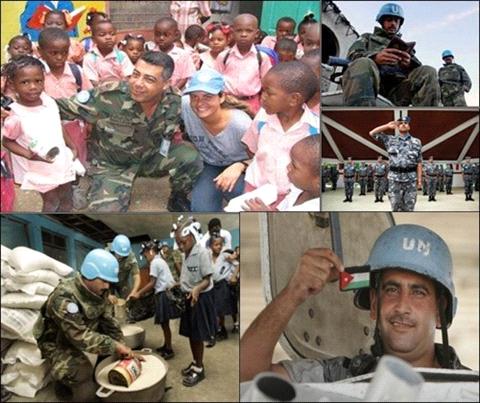By Mohammad Qaseem Ghadi / Australia
Jordan is one of the most respected and universally appreciated nations for its role in the dissemination of the principles of peace and justice at the global level.
Jordan, and thanks to the wise Hashemite leadership, reacts positively and with large international peacekeeping missions from a foreign policy based on moderation, non-interference in the affairs of others, and respect for international conventions, treaties and human rights, which gives Jordan a solid foundation in international relations.
Based on these foundations and at the behest of the late King Hussein Bin Talal, God rest his soul, which continues on under the Supreme Commander of the Armed Forces of Jordan His Majesty King Abdullah II Bin Al Hussein, starting on the twelfth of December, 1989, the Jordanian participation in the international peacekeeping forces commenced.
On the basis of a letter, Jordan sets throughout history the belief in the humanitarian role of the noble Arab army, which has become a model in the altruism, exceeded the limits of our dear homeland, in addition to its humanitarian and noble vision in a secure and peaceful world under the Charter of the United Nations, Jordan was called to support peace and security missions.
Jordan’s broad participation aims to Jordan's role as a global peace-loving nation. The human being, is Jordan’s biggest investment for the state, ‘he the nation's most precious possession,’ his sons remain the best ambassadors of the nation wherever they hold the Hilo; their competencies have been recognized near and far.
The Hashemite leadership, convinced of the importance of Jordan's role in international peacekeeping forces, and even the participants at a high level of responsibility and rehabilitation, established the Peacekeeping Institute at the Jordanian Armed Forces to prepare and qualify the participants in the international peacekeeping forces and prepare them before moving to their task, trained in all skills related to the conservation of peace, through means of periodicals and reports, communications, negotiation, questioning, lecturing, and human rights.
Reached so far, the size of the Jordanian participation in international peacekeeping operations in various areas of the United Nations peacekeeping troops and staff, hospital and international observers, reached nearly 61611 officers and men, starting in 1989 in Angola through the task of military observers and humanitarian security forces.
Jordanian Armed Forces’ participation in peacekeeping operations can be summarized in the following:
1) Former Yugoslavia: Jordan began to participate with Pplersal battalion in 1992 followed by three battalions in 1993,1994,1996 and 5 military observers and force command, and ended with 10 observers. By 1997, the number of participants reached 15346.
2) Sierra Leone: Jordanian Armed Forces started to participate in sending a mechanized infantry battalions and the confidentiality of medical and humanitarian staff. Beginning in 2000 and ending in 2001, the number of participants reached 1948 officers and security personnel.
3) East Timor: Jordan began to participate in 2000 by sending an infantry battalion of 767 officers and security personnel and 11 officers and security personnel in command of the force, and ended the year 2002 as the number of participants reached 2994.
4) Ethiopia and Eritrea: Jordanian participation started in 2000 through the infantry battalion of 891 officers and security personnel and medical company composed of 54 officers and security personnel and the number of participants reached 3806 and continues until now.
5) Kosovo: Jordan participated in these missions by a joint force with the United Arab Emirates beginning in 1999 and consisted of two factions of special operations from 48 participants in the sector, until the US intervention. Jordan’s participation in Kosovo ended in 2001 and the number of participants reached 208.
6) Tajikistan: Jordan participated by sending a medical team consisting of 3 doctors and a nurse in 1998 until 2000 and the number of participants reached 4 doctors and 3 nurses in addition to 28 military observers.
7) Angola: Jordan began to participate in 1996 by deploying 3 officers and 14 military observers. Participation ended in 1997.
8) Congo: Jordan began to participate in 2000 at the level of military observers consisting of 22, also deployed 6 armed forces officers corner of the force command and continues until now.
9) Afghanistan: Jordan took part in one special operation, and the number of participants reached 153 paratroopers and officers, 2 medical services, and a field hospital with 50 beds. This is in addition to 179 officers and security personnel, 3 Engineering, 14 minesweeping officers and security personnel, and 4 liaison officers.
This is in addition to a number of devices of high readiness of the forces, including: rapid deployment force of the United Nations, the High Readiness Brigade, military observers, military advisers and officers on loan.
Finally, we ask God grant mercy due to the martyrs who died for upholding their country, and please God Almighty, preserve our fellow Jordanians in all areas of the world working to maintain peace and stability under the Supreme Commander of the Armed Forces, His Majesty King Abdullah II Bin Al Hussein of Jordan.
